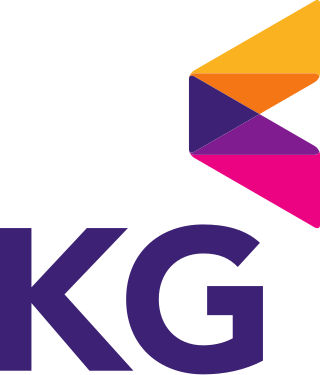
Daewoo also known as the Daewoo Group, was a major South Korean chaebol and automobile manufacturer.
The KG Mobility Corporation, abbreviated as KGM, is a South Korean automobile manufacturer. It traces its origins back to Dong-A Motor, a manufacturer established in 1954. The company was named SsangYong Motor Company in 1988, following its acquisition in 1986 by the SsangYong Group, a chaebol. Since then, SsangYong Motor has been acquired successively by Daewoo Motors, Chinese manufacturer SAIC Motor, and Indian manufacturer Mahindra & Mahindra. In 2022, the company was acquired by South Korean chaebol KG Group and adopted its present name in March 2023.

SK Group is a South Korean multinational manufacturing and services conglomerate headquartered in Seoul. A chaebol, SK Group is the second largest such conglomerate by revenue in South Korea, after Samsung Group. Through a number of subsidiaries, it is engaged in various businesses, including manufacture of chemicals and petrochemicals, semiconductors, flash memory and miscellaneous information technology, as well providing telecommunications services worldwide among its other less notable ventures.

Shinhan Financial Group Co., Ltd. is a financial holding company headquartered in Seoul, South Korea. Its subsidiaries provide a full range of financial services, including banking, securities, life insurance, and investment banking. It is one of Korea's so-called Big Five financial groups, along with KB Financial Group, NH Financial Group, Hana Financial Group, and Woori Financial Group.

Woori Bank is a Korean multinational bank headquartered in Seoul. It is one of the four largest domestic banks in South Korea and has a strong presence in commercial banking and corporate finance in the Republic of Korea. Tracing its roots to the Daehan Cheon-il Bank, founded in 1899, it went through multiple transformations until adopting its current name in 2002. By then, it was South Korea's second-largest bank, behind Kookmin Bank.
Sampyo Group is a South Korean manufacturer of construction materials, established in 1966. Headquartered in Seoul, it has an annual turnover of $3.0 billion. Its products include ready-mix concrete, construction aggregate, and fly ash. In 1980, Sampyo Group extended its line of business to railway track and bridge construction by establishing Sampyo Engineering & Construction.
Hanil Cement Co, Ltd. Korean: 한일시멘트(Hanja: 韓一-) is a cement, concrete and chemical company headquartered in Seoul, Korea, established in 1961. It produces portland cement products and cement under the brand Remital.
Sampyo Cement is a South Korean cement, concrete and chemical company headquartered in Seoul. It produces portland cement products. It was established in 1957 as Tong Yang Cement by Lee Yang-gu as the second of his many companies which would grow into the Tongyang Group, and was also later known as Tongyang Cement and Energy.

CJ Group (Korean: 씨제이) is a South Korean conglomerate holding company, operating internationally. It is one of the largest chaebol headquartered in Seoul, South Korea. It comprises numerous businesses in various industries of food and food service, logistics, pharmaceutics and biotechnology, entertainment and media, Pager and Telephone. CJ Group was originally a branch of Samsung.

A choco pie is a snack cake consisting of two small round layers of cake with marshmallow filling and a chocolate covering. The term originated in the United States but is now also used widely in South Korea, Japan, and countries to which it exports, and many other countries as either a brand name or a generic term. Names for similar confections in other places include chocolate marshmallow pie, Wagon Wheels, angel pie, and moon pie.

YG Entertainment is a South Korean multinational entertainment agency established in 1996 by Yang Hyun-suk. The company operates as a record label, talent agency, music production company, event management and concert production company, and music publishing house. In addition, the company operates a number of subsidiary ventures under a separate public traded company, YG Plus, which includes a clothing line, a golf management agency, and a cosmetics brand.

Hyun Jae-Hyun is chairman of Tongyang Group, a South Korean conglomerate founded in 1957 as a cement manufacturer.

JTBC is a South Korean nationwide pay television network. Its primary shareholder is JoongAng Holdings, with a 25% stake. It was launched on 1 December 2011. JTBC is a generalist channel, with programming consisting of television series, variety shows, and news broadcasting; its news division is held in similar regard to the three main terrestrial networks in South Korea.
Tongyang or Tong Yang may refer to:

KB Financial Group Inc. is a financial holding company headquartered in Seoul, South Korea. The Group and its subsidiaries provide a broad range of banking and financial services. It is one of the domestic systemically important banks (D-SIBs) identified by the Financial Services Commission.

Anbang Insurance Group was a Chinese holding company whose subsidiaries mainly deal with insurance, banking, and financial services based in Beijing. As of February 2017, the company had assets worth more than CN¥1.9 trillion. The Financial Times described Anbang as "one of China’s most politically connected companies."
Tygem is an internet go server owned by South Korean company TongYang Online. Popular in Asia, their website states that over 500 professional Go players use their service.

Signal Entertainment Group Corp., founded in 1991, is a South Korean company specializing in the following businesses: show business, media and entertainment content, cosmetics and information technology.
Dongyang (东阳市) is a county-level city in Zhejiang province, China.

The KG Group is a South Korean chaebol established in 2003 and operating, through its affiliates, in various industries and other businesses. The main affiliates of the KG Group are KG Chemical and KG Steel.












